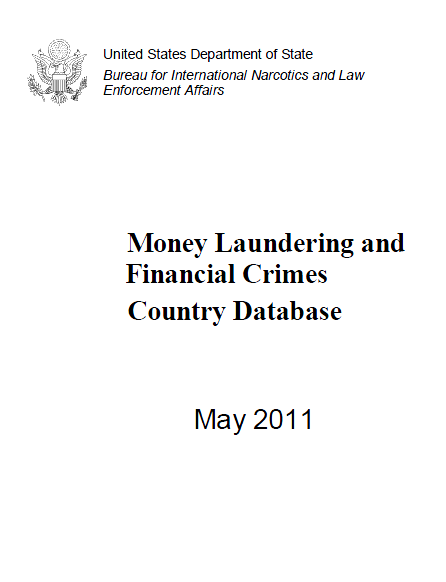Bureau for International Narcotics and Law Enforcement Affairs
- 383 pages
- May 2011
Every year, U.S. officials from agencies with anti-money laundering responsibilities meet to assess the money laundering situations in 200 jurisdictions. The review includes an assessment of the significance of financial transactions in the country‘s financial institutions involving proceeds of serious crime, steps taken or not taken to address financial crime and money laundering, each jurisdiction‘s vulnerability to money laundering, the conformance of its laws and policies to international standards, the effectiveness with which the government has acted, and the government‘s political will to take needed actions.
The 2011 International Narcotics Control Strategy Report, Money Laundering and Financial Crimes, highlights the most significant steps countries and jurisdictions categorized as ―Major Money Laundering Countries‖ have taken to improve their anti-money laundering/counter-terrorist financing (AML/CFT) regimes. The report provides a snapshot of the AML/CFT legal infrastructure of each country or jurisdiction and its capacity to share information and cooperate in international investigations. For each country where they have been completed, the write-up also provides a link to the most recent mutual evaluation performed by or on behalf of the Financial Action Task Force (FATF) or the FATF-style regional body to which the country or jurisdiction belongs. When applicable, relevant country reports also provide links to the Department of State‘s ―Country Reports on Terrorism‖ so the reader can learn more about issues specific to terrorism and terrorism financing. Providing these links will allow those interested readers to find detailed information on the country‘s AML/CFT capacity and the effectiveness of its programs.
In addition, the report contains details of United States Government efforts to provide technical assistance and training as well as information on the multilateral organizations we support, either monetarily and/or through participation in their programs. In 2010, USG personnel leveraged their expertise to share their experience and knowledge with over 100 countries. They worked independently and with other donor countries and organizations to provide training programs, mentoring and support for supervisory, law enforcement, prosecutorial, customs and financial intelligence unit personnel as well as private sector entities. We expect these efforts, over time, will build capacity in jurisdictions that are lacking, strengthen the overall level of global compliance with international standards and contribute to an increase in prosecutions and convictions of those who launder money or finance terrorists or terrorist acts.
Money laundering continues to be a serious global threat. Jurisdictions flooded with illicit funds are vulnerable to the breakdown of the rule of law, the corruption of public officials and destabilization of their economies. The development of new technologies and the possibility of linkages between illegal activities that generate considerable proceeds and the funding of terrorist groups only exacerbate the challenges faced by the financial, law enforcement, supervisory, legal and intelligence communities. The continued development of AML/CFT regimes to deter criminal activity and detect illicit proceeds is reflected in this report again this year. Political stability, democracy and free markets depend on solvent, stable, and honest financial, commercial, and trade systems. The Department of State‘s Bureau of International Narcotics and Law Enforcement Affairs looks forward to continuing to work with our U.S. and international partners in furthering this important work and strengthening capacities globally to combat money laundering and the funding of terrorists and terrorism.


